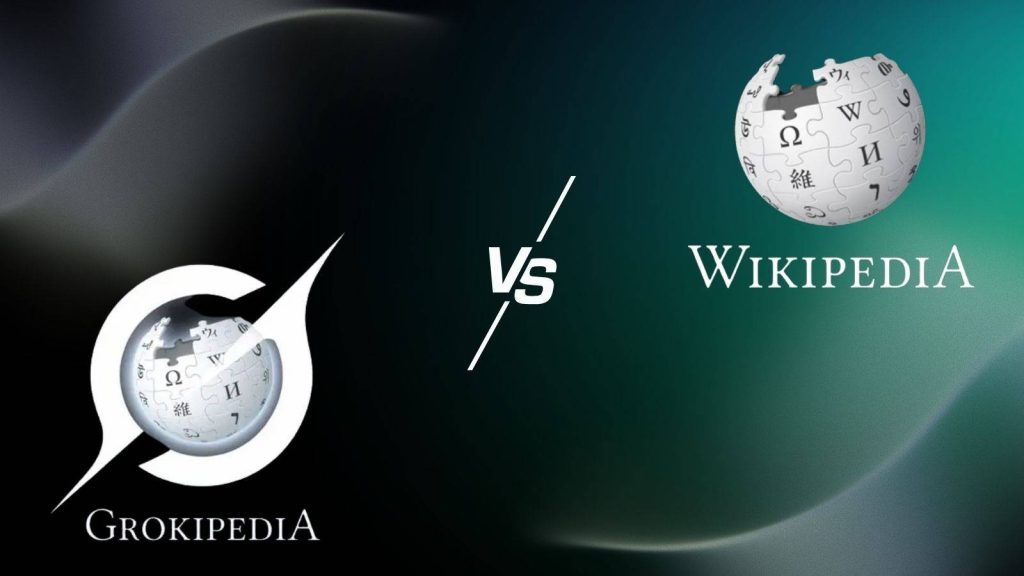In today’s digital era, where information evolves every second, the tools we rely on for learning must evolve too. For more than two decades, Wikipedia has served as the backbone of online knowledge — a trusted encyclopedia built by people, for people. But now, a new wave of innovation is sweeping the internet with Grokipedia, an AI-powered encyclopedia designed to learn, adapt, and update in real time.
As users increasingly search for “Grokipedia vs Wikipedia” and wonder which one delivers more reliable and personalized knowledge, this article offers a clear, detailed, and human-friendly guide comparing both platforms.
Why People Are Comparing Grokipedia and Wikipedia
Since early 2025, conversations about AI encyclopedias have surged online, especially as tools like ChatGPT, Claude, and Gemini changed how people search for information. Grokipedia emerged as an AI encyclopedia that automatically learns, curates, and summarizes data — almost like having a personalized knowledge assistant.
Wikipedia, on the other hand, remains the most trusted open-source platform with millions of contributors worldwide. It has no AI shortcuts, no algorithms — just human intelligence, peer review, and transparency.
So naturally, users are now asking: Can Grokipedia offer the same trust that Wikipedia has earned? This comparison explores every angle — from technology and accuracy to ethics and user experience — to help you understand which encyclopedia best fits your needs in 2025.
What Is Grokipedia? New AI Encyclopedia Explained
Grokipedia is a next-generation encyclopedia built on artificial intelligence and machine learning. It works by continuously scanning verified sources, analyzing real-time data, and generating concise, human-readable summaries.
Unlike static encyclopedias, Grokipedia evolves — meaning information is updated automatically as events unfold. Whether it’s a scientific discovery, breaking news, or a tech update, Grokipedia’s AI identifies credible updates faster than human editors could.
It also features conversational responses, allowing users to ask questions in natural language and receive smart, summarized answers — similar to chatting with a human expert. Grokipedia combines AI-driven understanding with structured learning, offering a mix of speed, intelligence, and personalization unmatched by traditional models.
In essence, it’s not just an encyclopedia — it’s an AI-powered learning ecosystem that continuously grows smarter with every search.
What Is Wikipedia? Classic Open-Source Knowledge Platform
Launched in 2001, Wikipedia remains one of the internet’s most trusted information sources, featuring over 6.8 million articles in English alone. It’s a community-driven encyclopedia, where thousands of volunteer editors contribute to building and maintaining accurate content.
The platform’s success lies in its transparency — every edit is tracked, every claim must be cited, and every article is open for public review. Unlike AI-generated content, Wikipedia is built on human judgment, ethical writing, and factual accountability.
Over the years, Wikipedia has become the foundation of digital literacy, widely used by researchers, educators, and students. Its strict neutral point of view policy ensures articles are unbiased and based on verifiable facts, making it a reliable source for academia and beyond.
Grokipedia vs. Wikipedia: Key Differences at a Glance
| Feature | Grokipedia (AI Encyclopedia) | Wikipedia (Human Encyclopedia) |
|---|---|---|
| Technology Base | AI-driven with NLP and real-time data analysis | Human-written, community-reviewed |
| Update Frequency | Instant, automated updates | Manual, dependent on volunteer editors |
| Accuracy Model | Algorithmic validation and cross-checking | Peer-reviewed with citations |
| Personalization | Highly tailored to user behavior | One-size-fits-all information |
| Speed of Information | Near-instant updates and summaries | Slower updates, human moderation |
| Bias Control | Uses AI context filters | Relies on community neutrality policies |
| User Interaction | Conversational, question-based responses | Static text-based pages |
Analysis:
Grokipedia’s main strength lies in its speed and customization, while Wikipedia’s advantage is its trustworthiness and editorial transparency. Grokipedia suits users who prefer quick, AI-generated overviews; Wikipedia remains ideal for deep research and verified learning.
How Grokipedia Uses AI to Improve Accuracy and Personalization
Grokipedia isn’t just a collection of articles — it’s an intelligent system that learns from your interests. Using AI algorithms, it understands what topics you engage with most and adjusts its recommendations accordingly.
Its real-time fact-checking feature compares data from multiple credible sources before presenting the information. If one source seems unreliable, the AI either flags it or uses more trusted references. This approach drastically reduces misinformation and keeps content relevant.
Grokipedia’s natural language generation (NLG) ensures content is not robotic but written in a human-like tone. Combined with AI summarization, users can consume complex information in seconds — perfect for students, journalists, or busy professionals who need accuracy without reading lengthy pages.
Wikipedia’s Strength: Human Collaboration and Community Trust
What makes Wikipedia exceptional is its human community. Thousands of volunteers — from academics to enthusiasts — ensure that every article meets editorial standards. Each edit must follow strict guidelines for neutrality and citation, creating a layered trust system that AI cannot fully replicate.
This community-driven approach has helped Wikipedia maintain long-term credibility. It is also transparent — every article includes a revision history and reference list, allowing users to verify the source material.
Wikipedia’s mission remains noble and consistent: “to provide free access to the sum of all human knowledge.” And despite the rise of AI tools, it continues to rank as one of the most visited websites in the world, proving that human-edited knowledge still has immense value.
Which One Is More Reliable in 2025? Expert Comparison
Reliability is a nuanced issue. Experts argue that while AI encyclopedias like Grokipedia are more efficient, they can sometimes misinterpret context or generate confident errors (known as “AI hallucinations”). This makes human oversight essential for sensitive or complex topics.
On the other hand, Wikipedia’s editorial process, though slower, ensures articles are well-sourced and community-approved. Its system of discussion pages and editor debates maintains factual integrity even during controversial updates.
Therefore, in 2025, the most reliable model may be a hybrid approach — where AI assists in content updates and humans provide verification. Grokipedia might lead in real-time reporting, but Wikipedia continues to lead in long-term accuracy and citation strength.
Accessibility and User Experience: Grokipedia vs. Wikipedia
When it comes to user experience, Grokipedia feels like the encyclopedia of the future. It features interactive chat interfaces, voice-based searches, and visual summaries using charts and infographics. Users can even customize learning modes — quick summaries, deep dives, or side-by-side comparisons.
Wikipedia, however, excels in universal accessibility. It loads quickly, even on low-bandwidth devices, and supports over 300 languages. Its simple layout ensures easy readability and minimal distractions.
While Grokipedia attracts tech-savvy audiences who prefer AI-assisted exploration, Wikipedia remains a cornerstone for educators, schools, and countries with limited digital infrastructure.
Privacy and Data Ethics: How Both Platforms Handle User Data
AI platforms like Grokipedia often rely on user data to personalize experiences — including search patterns, reading time, and previous interests. While most claim to anonymize this data, privacy-conscious users might still have concerns about how their data is stored or used for training models.
Wikipedia, however, is celebrated for its privacy-first policy. It doesn’t track individual behavior, doesn’t serve ads, and doesn’t sell user data. The platform’s funding comes entirely from global donations, reinforcing its commitment to neutrality and openness.
So, for users prioritizing ethical transparency and digital privacy, Wikipedia clearly holds the moral high ground.
Future of Knowledge Platforms: Will Grokipedia Replace Wikipedia?
It’s unlikely that Grokipedia will replace Wikipedia. Instead, experts foresee a collaborative future, where both platforms play distinct but complementary roles.
Grokipedia could evolve into the real-time knowledge layer, instantly summarizing breaking developments, while Wikipedia remains the archival library of verified facts. Together, they could form a powerful partnership between AI precision and human wisdom.
In fact, many technologists believe the future of learning lies in AI-assisted human collaboration, where platforms like Grokipedia speed up the process, and communities like Wikipedia ensure the truth behind every update.
So, the next time you wonder which to use — remember this:
- Use Grokipedia when you want speed, summaries, and AI assistance.
- Use Wikipedia when you need credibility, citations, and human-verified knowledge.
Together, they redefine how we learn, think, and share in the age of artificial intelligence.
FAQs
1. What is Grokipedia and how is it different from Wikipedia?
Grokipedia is an AI-powered encyclopedia that uses machine learning to provide real-time, summarized, and personalized information. In contrast, Wikipedia is a human-edited platform built on community contributions and verified citations. Grokipedia focuses on speed and adaptability, while Wikipedia emphasizes reliability and transparency.
2. Which is more accurate — Grokipedia or Wikipedia?
Wikipedia currently holds higher credibility due to its peer-reviewed and citation-based content. Grokipedia offers instant AI-generated updates but can occasionally produce errors if data sources are misinterpreted. For verified facts, Wikipedia is more accurate; for real-time summaries, Grokipedia is faster.
3. Who owns and operates Grokipedia?
Grokipedia is a new AI encyclopedia initiative reportedly developed by emerging artificial intelligence organizations focused on building smarter, automated knowledge systems. Unlike Wikipedia, which is operated by the non-profit Wikimedia Foundation, Grokipedia is backed by AI innovation companies.
4. Is Grokipedia free to use like Wikipedia?
Yes, Grokipedia is generally free for users, similar to Wikipedia. However, Grokipedia may include optional premium features for advanced AI-assisted tools, personalized learning dashboards, or ad-free experiences in the future.
5. Can Grokipedia replace Wikipedia in the future?
It’s unlikely. Grokipedia and Wikipedia serve different purposes. Grokipedia excels at delivering quick, AI-curated insights, while Wikipedia remains the go-to source for verified, human-reviewed knowledge. Experts believe both will coexist — combining AI’s speed with human reliability.
6. Which is better for students — Grokipedia or Wikipedia?
For students seeking concise explanations or quick topic overviews, Grokipedia is ideal. For research papers, projects, and academic citations, Wikipedia remains more suitable because its information is referenced, transparent, and widely accepted in educational institutions.
7. How does Grokipedia update information compared to Wikipedia?
Grokipedia updates content automatically using AI algorithms that scan real-time data from trusted sources. Wikipedia, however, relies on volunteer editors who manually verify and update articles. Grokipedia is faster, but Wikipedia’s human moderation ensures higher accuracy.
8. Is Grokipedia reliable for academic or professional research?
Grokipedia is excellent for general learning and fast information but is not yet considered a primary academic source due to limited citation transparency. For professional or scholarly research, Wikipedia’s referenced, verifiable structure remains more dependable.
9. Does Grokipedia use AI-generated content or human-edited content?
Grokipedia primarily uses AI-generated content that is continually refined using algorithms and machine learning. Human reviewers may monitor sensitive or trending topics, but the platform’s core content creation relies on artificial intelligence.
10. Which is safer and more private to use — Grokipedia or Wikipedia?
Wikipedia is safer from a privacy perspective because it doesn’t track users, display ads, or collect personal data. Grokipedia may use anonymized user data for personalization and AI training. Those prioritizing privacy may prefer Wikipedia’s transparent, non-profit model.




